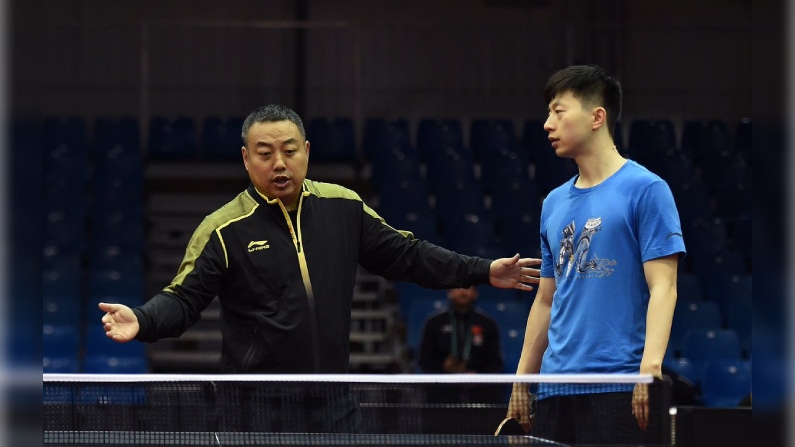"Just because you're paranoid doesn't mean they're not after you," reasoned Joseph Heller in his 1961 novel "Catch-22" (a line echoed 30 years later by Kurt Cobain of Nirvana). In an odd way, this not-at-all-reassuring line of reasoning may be of interest to China's Ma Long (pictured, right). Ma cemented his all-time greatness in Rio 2016, winning the men's singles gold medal over countryman and defending champion Zhang Zike. Now that the 32-year-old Ma is the man to beat, he faces a world of young, hungry challengers. Carrying the flag for this ceaseless crusade of challengers is none other than his own teammate, world #1 Fan Zhendong, in his prime at just 24 years of age. Add the not insignificant expectations of 1.4 billion table tennis-crazed Chinese fans, and it would be more than enough to make Ma feel like the walls were closing in on him. Now, as it turns out, they actually are. According to Chinese Table Tennis Association president Liu Guoliang (pictured, left), himself a many-time Olympic champion as a player and coach, they just don't make 'em like they used to. "The whole playing space is smaller than usual," Liu observed. Liu was seen pacing the floors at the Japan National Stadium, not only out of nervousness but in a well-practiced scientific measurement. "World competitions normally have areas measuring seven by 14 meters," Liu contextualized before delivering his damning verdict: "I just measured it at six by 11 meters." For a Chinese national team which prepares for every competition in minute detail, any deviation from the script is a major problem. "I’m a little worried about the athletes’ running and safety," said Liu. "It’s quite different from before." One of China's stars, double specialist Xu Xin, has already noticed the effects of the cramped quarters. "We have been noticing the size of the playing area throughout," commented Xu, who is known to make use of every square inch of available real estate with his acrobatic style. "Several side serves hit the screen board (at the side of the court) and we were slightly affected." In all likelihood, the changes were the innocent result of overwhelmed Olympic organizers. It is worth noting, however, that Japan's top medal prospects, Mima Ito (women's world #2) and Tomokazu Harimoto (men's world #4), seldom stray far from the table. Thus, while defenders and all-around players would encounter unforeseen barriers, the host nation's top players would unlikely be affected by the reduced perimeter. Of course, it would be irresponsible and potentially libelous to fan the flames of conspiratorial theorizing, so we need not stray down that perilous path. At any rate, if anyone has Ma Long's ear, it would be instructive to know which is preferable: feeling paranoid like the world is closing in on you, or being reassured that you're not crazy because it actually is closing in on you? It's really a Catch-22.
More at TV9News
